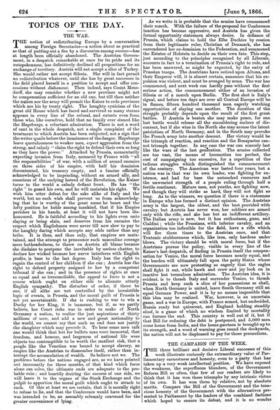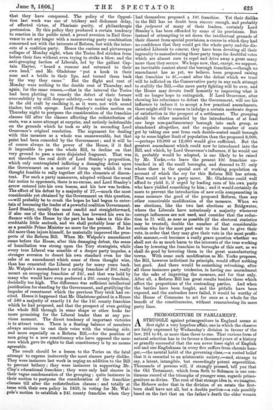THE CAMPAIGN OF THE WEEK.
TliEthree brilliant and decisive Liberal successes of this week illustrate curiously the extraordinary value of Par- liamentary earnestness and honesty, even to a party that has taken up a very weak intellectual position. We have exposed the weakness, the superfluous blunders, of the Government Reform Bill so often, that few of our readers are likely to think that it has won these triumphs by -any intrinsic virtue of its own. It has won them by relative, not by absolute merits. Compare the Bill of the Government and the tena- cious honesty of the Government with the alternatives pre- sented to Parliament by the leaders of the combined factions which hoped to ensure its defeat, and it is no wonder that they have conquered. The policy of the Opposi- tion last week was one of trickery and dishonest delay, -of affected virtue, of Pharisaic purity, of philanthropic pretension. By this policy they produced a certain tendency to reaction in the public mind, a proud aversion in Earl Gros- venor to act any longer with a mancenvring party combination -concerned not with the interests of Reform, but with the inter- -eats of a coalition party. Hence the curious and picturesque collapse of Monday night, when the Tories fled stricken from before their foes without, even trying to strike a blow, and the anti-grouping faction of Liberals, led by the gallant Cap- tain Hayter, "heard a rumour and returned to their -own land," and Mr. Gladstone "put a hook in their _nose and a bridle in their lips, and turned them back by the way they came." But the flight and rout of lionday were nothing to the double rout of Thursday, and .again, for the same reason,—that in the interval the Tories had been plotting to remedy the defect of their former -over-subtlety by still deeper subtlety,—to mend up the leaks in the old craft by caulking it, as it were, not with sound timber, but with sponge. Lord Stanley's sudden motion on Thursday night to postpone the consideration of the franchise .clauses till after the clauses affecting the redistribution of seats, was a mere attempt at surprise, and entirely indefensible -on the grounds which he took so ably in seconding Lord 'Grosvenor 's original resolution. The argument for dealing with this measure as a whole was unanswerable, but that point had been conceded by the Government ; and it will be -of course always in the power of the House, if it find it impossible to pass the whole Bill, to decline on that very ground to pass a mere disjointed fragment. That was not therefore the real drift of Lord Stanley's proposition, which only contemplated inflicting a damaging defeat upon -the Government on a matter of form upon which it was thought feasible to rally together all the elements of discon- tent. For such a party manceuvre, adopted without the usual fair notice to opponents, there is no excuse, and Lord Stanley's arrow entered into his own bosom, and his bow was broken. The effect of his defeat by a majority of 27,—much the most considerable yet obtained by the Government on this question, —will probably be to crush the hopes he had began to enter- tain of becoming the leader of a powerful coalition Government. Lord Stanley, usually the most candid and straightforward, if also one of the bluntest of foes, has lowered his own in- fluence with the House by the part he has taken in this dis- creditable little ambush, and we shall probably hear of him as a possible Prime Minister no more for the present. But he did more than injure himself, he materially improved the pros- pects of the Reform Bill. When Mr. Walpole's amendment c,ame before the House, after this damaging defeat, the sense of humiliation was strong upon the Tory strategists, while every true Liberal was sensible of a deeper party impulse, a stronger aversion to desert his own standard even for the sake of an amendment which some of them thought wise, than has cemented the Liberal party for many years back. _Mr. Walpole's amendment for a rating franchise of 20/. really meant an occupying franchise of 241., and that was held by many who would have even preferred a 20/. county franchise, decidedly too high. The difference *as sufficient intellectual justification for standing by the Government, and gratifying the impulse of resentment which the previous Tory trick had ex- cited. Hence it happened that Mr. Gladstone gained in a House -of 580 a majority of exactly 14 for the 14/. county franchise which he had proposed, and that the prospect of even getting the whole Bill through in some shape or other looks far more promising for the Liberal leader than at any pre- vious moment. The direct tendency of important victories is to attract votes. There is a floating balance of members .always anxious to cast their votes with the winning side, and more especially on a Reform Bill,—for the position of men going to a new constituency who have opposed the mea- sure which gave its rights to that constituency is by no means agreeable.
The result should be a lesson to the Tories on the fatal attempt to express insincerely the most sincere party dislike. They were insincere last week in urging an addition to the Bill to prevent bribery ; they were insincere in supporting Mr. 'Clay's educational franchise ; they were only half sincere in their vague condemnation of the grouping ; quite insincere in their motion to postpone the consideration of the franchise -clauses till after the redistribution clauses ; and totally at issue with their own policy in 1859, in voting for Mr. Wal- pole's motion to establish a 24/. county franchise when they had themselves proposed a 10/. franchise. Yet their dislike to the Bill has no doubt been sincere enough, and probably
the judgment of many of their leaders, certainly Lord
Stanley's, has been offended by some of its provisions. But instead of attempting to set down the intellectual grounds of their dissent from special provisions, a course in which they had no confidence that they could get the whole party and the dis- satisfiea Liberals to concur, they have been devoting all their ingenuity to manufacturing those party traps for doubtful votes which are almost sure to repel and drive away a great many more than they secure. We hope now, that, except, we suppose,
an inevitable contest about the borough franchise,—though no amendment has as yet, we believe, been proposed raising that franchise to 81.,—and after the defeat which we trust will be inflicted on the Conservative party in any such attempt to stultify the Bill,—the mere party fighting will be over, and the House may devote itself honestly to improving what it will no longer hope to extinguish. If Lord Grosvenor, after showing his reluctance to defeat the Government, will use his influence to induce it to accept a few practical amendments, there might still be reason to indulge a certain moderate degree of satisfaction in the prospect of a settlement. The grouping should be either amended by the introduction of at least one large non-parliamentary borough into each group, or abandoned altogether, and the requisite number of seats got by taking one seat from each double-seated small borough up to some higher limit of population than the proposed 8,000, —perhaps 10,000 or 12,000 would give sufficient. But the greatest amendment which could now be introduced into the Bill, and which, by Lord Grosvenor's influence, if he would use it, probably would be adopted, is one likely to be raised by Mr. Yorke,—to leave the present 10/. franchise un- touched in all the small boroughs, and descend to 71. only where there is the special sort of working population on account of which the cry for this Reform Bill has arisen. That would not be a party move. Mr. Gladstone could, well afford to yield it, if urged by leading men of his own party who have yielded something to him ; and it would certainly do more to prevent the introduction of new evils compensating in some measure the good of the proposed Reform, than any other conceivable modification of the measure. When we see elections, like the two last elections at Bridgviater, where the Liberals have notoriously a majority whenever corrupt influences are not used, and consider that the reduc- tion to 71. will, as near as possible (if the electoral statistics may be trusted), double the number- of that considerable section who for the most part wait to the last to give their vote, in order that they may give their vote in the most profit- able manner,—it becomes a really grave question whether " we shall not do as much harm to the interests of the true working class by lowering the franchise in boroughs of this sort, as we shall do good by lowering them in the great manufacturing towns. With some such modification as Mr. Yorke proposes, the Bill, however indistinct its principle, would effect nothing but good. And there would be something refreshing, after all these insincere party trickeries, in having one amendment for the sake of improving the measure, and for that only. After all, a Reform Bill has great results besides those which affect the proportions of the contending patties. And when the battles have been fought, and the pitfalls have been exposed, and the ambushes have failed, it would be worthy of the House of Commons to act for once as a whole for the benefit of the constituencies, without remembering its mere party lines.































 Previous page
Previous page